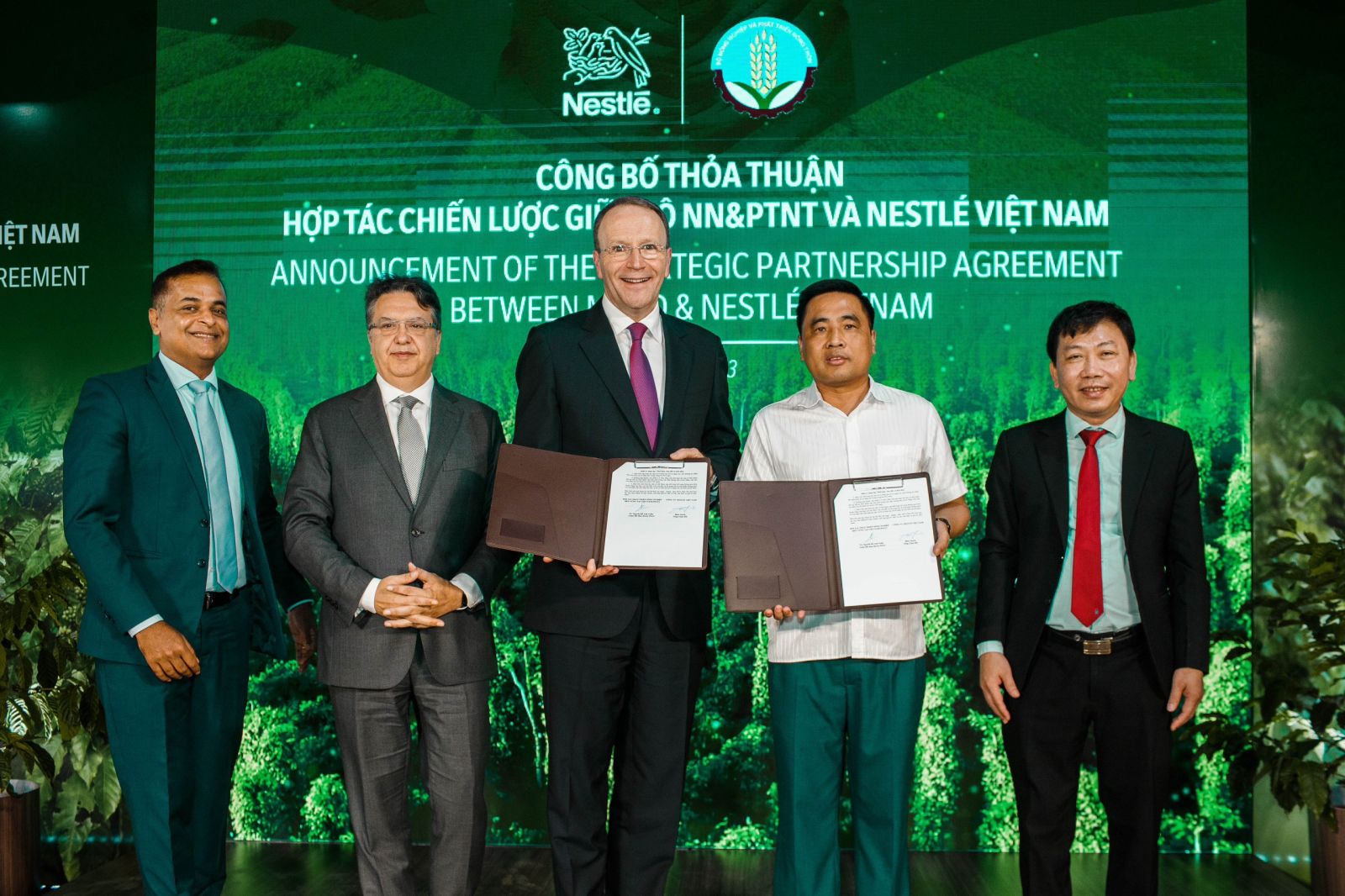- Giới thiệu
- Nhóm Công tác
- Tin tức
- Thông tin về FTA
- Tài Liệu
- Sự kiện
- Liên hệ
Nestlé Vietnam commits to sustainable agriculture development
On June 20, within the framework of the Partnership for Sustainable Agriculture in Vietnam (PSAV), Nestlé Vietnam Co., Ltd. and the Ministry of Agriculture and Rural Development (MARD) signed a Memorandum of Understanding (MOU) on strengthening public-private cooperation toward sustainable, regenerative, and low-emission agriculture. MARD leaders met and worked with Mr. Mark Schneider, CEO of Nestlé Global.

The MOU recognizes Nestlé Vietnam as an active member of PSAV for strengthening the public-private partnership. The enterprise has connected research institutes and local authorities in implementing projects to increase the value of supply chains and agricultural products, promote regenerative agriculture, contribute to net zero emissions, and improve the farmers’ well-being.
Furthermore, in the meeting, MARD Deputy Minister Nguyen Quoc Tri and Nestlé Director Mark Schneider officially launched the project “Agroforestry and Reforestation in the Central Highlands of Vietnam.” The project aims to plant at least 2.3 million trees (wooden trees, fruit trees, etc.) in four Central Highlands provinces, helping to remove about 480,000 tons of CO2 emission in the five-year period (2023-2027). This model not only brings economic benefits to local farmers and Vietnam’s coffee industry, but also protects the ecosystem, restores the land, decreases climate change, and moves towards green, sustainable agriculture development.
With the European Union’s Deforestation-free Regulation (EUDR) coming into force in December 2024, the partnership between MARD and Nestlé Vietnam is significant. The public-private cooperation is a positive sign for Vietnam’s coffee exports, reinforcing the image of sustainable and environmentally friendly agricultural products.
In that context, Vietnam Agriculture Newspaper interviewed Mr. Nguyen Do Anh Tuan, Director of the International Cooperation Department – MARD – to clarify future opportunities for which the MOU with Nestlé Vietnam is a critical premise.
Could you tell us about the significance of Nestlé – a leading coffee processing and distribution enterprise in Vietnam – signing the MOU on sustainable agricultural development and supporting the implementation of agroforestry projects, aiming to plant 2.5 million trees in the Central Highlands?
The MOU between Partnership for Sustainable Agriculture in Vietnam (PSAV) and Nestlé Vietnam Co., Ltd on sustainable, regenerative, and low-emission agriculture will promote Public Private Partnership (PPP), supporting the Vietnamese government’s commitment to achieving net zero emissions by 2050. At the same time, the MOU strengthens information exchange regarding regenerative agricultural practices towards low-emission agriculture in response to climate change; promotes technology transfer and digital transformation through research; communicates and raises awareness among multiple stakeholders.
The Agroforestry and Reforestation in the Central Highlands of Vietnam project – a joint effort between Nestlé Vietnam Co., Ltd., Western Highlands Agriculture & Forestry Science Institute, and Tay Nguyen University – will plant about 2.5 million trees in four provinces of the Central Highlands (Dak Lak, Lam Dong, Gia Lai and Dak Nong) The project will contribute to the progress of Vietnam’s 1 billion tree planting program. The project deploys pilot planting of forest and fruit trees on coffee fields, following a model of agroforestry/intercropping. It aims to plant about 2.5 million trees between 2023–2027. The project is expected to improve economic value, farmers’ income, and coffee farming conditions; especially resisting pests and natural disasters caused by climate change (drought, storm, etc.) to restore the land. The project also demonstrates fruitful public-private investment in ecological, low-emission, and sustainable agricultural development, demonstrating corporate social responsibility in addition to production and commerce.
Are there many local enterprises in Vietnam interested in forest regeneration like Nestlé?
Nestlé’s initiative has inspired and motivated many others – including local and international coffee industry enterprises – to adopt inclusive and sustainable management. Some Vietnamese enterprises, Vinh Hiep for example, are developing organic coffee products to reach demanding markets. Besides, enterprises in other industries are also developing methodologies and core values, meeting international standards not only in quality but also factors of production and sustainability.
As the EU will soon implement EUDR, how Nestlé’s commitment to sustainable agricultural development may influence the private sector to take action?
As the EU will soon implement EUDR, Nestlé’s participation in sustainable agriculture via public-private partnerships and agroforestry projects will further promote green development and farmers’ livelihood while adapting to EU regulation. It not only protects but also expands and regenerates the existing forest area. In technical terms, these are nature-based and nature-positive approaches. Nestlé’s success will influence local enterprises to prevent deforestation and combat forest degradation through conservation, restoration, forest management, and value chains, altogether improving the environment.
Nestlé has shown its social responsibility to the farmers’ livelihoods as well as Vietnam’s environment. From the government’s perspective, what plan does MARD provide to local and international enterprises as they respond to environmental issues by fostering public-private partnerships?
The public-private partnership between Nestlé and PSAV demonstrates effective cooperation to develop ecological, low-emission, and sustainable agriculture. It also shows the enterprise’s social responsibility besides production and investment. MARD (via PSAV) will facilitate conversation to remove barriers and create the most favorable policy system for local and international enterprises to invest in public-private partnerships. We connect with local farmers to develop green, low-emission, and sustainable agriculture, thereby enhancing Vietnam’s position in the global agriculture market.
Tin liên quan
PSAV Attends the 30th Anniversary Celebration of Cargill Vietnam2025/10/23
Plant health management helps increase coffee yield up to 15%2025/10/16
An Giang to host 2025 OCOP forum for sustainable development2025/09/25
Viet Nam and France foster cooperation on blue economy and sustainable environment2025/09/29
Agriculture and Environment exhibition ready for National celebration2025/08/27



 Điều lệ hoạt động
Điều lệ hoạt động



















































